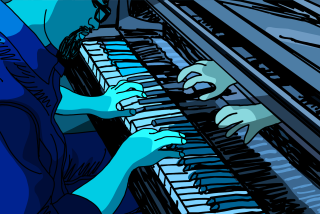MOVIE REVIEW : RE-CREATING REFUGE OF ‘QUILOMBO’
It is Brazilian film maker Carlos Diegues’ gift to be able to create entrancing, sensual film epics from his country’s tumultuous experience.
This all-embracing form allows Diegues (“Bye, Bye Brazil,” “Xica,”) to range easily from myth to history to satire, from comedy to tragedy, and from past to present. His vision is broad and deep enough to allow him to look beyond social protest and capture a timeless sense of human destiny.
“Quilombo” (at the Nuart through Thursday) is his most ambitious film to date. He has said himself that the saga of Quilombo dos Palmares is the essential Brazilian epic; bringing it to the screen represents a prodigious feat of imagination and research.
“Quilombo” is the name given to any community of runaway slaves, and Palmares, situated in the mountains of northeastern Brazil, became at the end of the 16th Century a refuge for blacks escaping the brutality of life on the sugar plantations. Palmares was already settled when the massive runaway slave, Albioca (the Paul Robeson-like Toni Tornado), made his way there to be chosen Ganga Zumba, guiding spirit of the free black republic. Subsequently, Ganga Zumba was joined by a young man, Zumbi (Antonio Pompeo), who became the emerging nation’s immortal warrior and defender. The stunning Zeze Motta is here Gunga Zumba’s serene, courageous wife.
The Palmares that Diegues re-creates is an earthly paradise, perhaps the first-known democratic society in the Western Hemisphere, and a celebration of the rituals, customs, arts and crafts derived from the ex-slaves’ rich African heritage. But Diegues shows life there to be as vulnerable as it is idyllic.
Very early on, the film becomes a series of sieges by the white man, determined to grab mineral-rich Palmares by force or deceit. As a result, the highly allegorical “Quilombo” tends toward the repetitious, though gradually we realize that each encounter mirrors the evolution of Brazil’s complex culture. (There’s usually a discursive quality to Brazilian films, perhaps in part from the rhythms set by their intoxicating samba scores, such as Gilberto Gil’s here.)
These encounters, often lethal, are at other times amusing or ironic. There is a conscious decision on the part of the Palmarinos not to emulate the white man but rather to strive for peace and harmony rather than strife, welcoming refugees of all colors and cultures. (A French prostitute from Recife becomes Ganga Zumba’s chief counselor as well as lover.) There’s a jolting contrast between the blacks with their body paintings and natural elegance and their tormentors, bewigged and decked out in lacy finery worthy of Louis XIV’s court, peering incongrously--and filthily--beneath heavy suits of armor.
But the longer Palmares survived, the more the Portuguese became determined to destroy it, finally resorting to cannon fire. At last, Diegues shows Zumbi and his people realizing that their ancient high priestess’ insistence that “Palmares is eternal” means that the idea of the community will survive, even if they, as a group, do not. More than a century later Palmares is reported still a refuge for the oppressed. For Diegues and for audiences in Brazil and elsewhere, it remains a model of what their country might yet become.
More to Read
Only good movies
Get the Indie Focus newsletter, Mark Olsen's weekly guide to the world of cinema.
You may occasionally receive promotional content from the Los Angeles Times.










